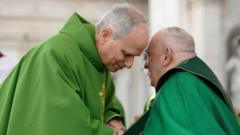Empty Line
The conclave that selected Cardinal Prevost was notably quick, indicating a collective predilection among voting cardinals for a leader viewed as well-equipped to navigate the church's challenges. Throughout the pre-election discussions—both formal and informal—two paramount themes emerged: "continuity" and "unity", with many cardinals recognizing the significant strides made by Pope Francis in addressing societal issues. His initiatives to advocate for marginalized communities and bring attention to global injustices were widely appreciated.
Yet, there remains a pressing need to address internal divisions characterized by traditionalist and progressive factions within the Church, which underpinned the rising support for Prevost. His history of cooperating with Pope Francis while maintaining a moderate stature among various ideologies allowed him to emerge as a viable candidate.
As the Church stands at a complex juncture amidst global strife, cardinals were mindful of the pope’s role in unifying not just the Catholic community but the broader human race as well. Prevost, with his dual heritage from the US and Peru, embodies the potential to bridge distinct cultural divides, making him a compelling choice for a global shepherd.
Prevost faces the added challenge of gaining broader support on vital issues like migration, climate change, and inequality—areas where Pope Francis struggled to gain traction, particularly in the US. During his inaugural address from the Vatican balcony, he emphasized themes of "building bridges" and global unity, signaling a continuity of Francis' vision while reinforcing his own commitment to these pressing issues.
As scrutiny over his past and perspectives begins, the cardinals seem to have been confident in Prevost's ability to navigate the Church forward. The clarity of his mission and the strong mandate he’s received from the conclave signals that while challenges loom, Prevost's election reflects a strategic and hopeful choice for the Catholic Church's future.
In summation, Pope Leo XIV's election emphasizes a commitment to continuity, unity, and compassion in a time when the Catholic Church remains a crucial voice in the global conversation on human dignity and moral guidance.
The conclave that selected Cardinal Prevost was notably quick, indicating a collective predilection among voting cardinals for a leader viewed as well-equipped to navigate the church's challenges. Throughout the pre-election discussions—both formal and informal—two paramount themes emerged: "continuity" and "unity", with many cardinals recognizing the significant strides made by Pope Francis in addressing societal issues. His initiatives to advocate for marginalized communities and bring attention to global injustices were widely appreciated.
Yet, there remains a pressing need to address internal divisions characterized by traditionalist and progressive factions within the Church, which underpinned the rising support for Prevost. His history of cooperating with Pope Francis while maintaining a moderate stature among various ideologies allowed him to emerge as a viable candidate.
As the Church stands at a complex juncture amidst global strife, cardinals were mindful of the pope’s role in unifying not just the Catholic community but the broader human race as well. Prevost, with his dual heritage from the US and Peru, embodies the potential to bridge distinct cultural divides, making him a compelling choice for a global shepherd.
Prevost faces the added challenge of gaining broader support on vital issues like migration, climate change, and inequality—areas where Pope Francis struggled to gain traction, particularly in the US. During his inaugural address from the Vatican balcony, he emphasized themes of "building bridges" and global unity, signaling a continuity of Francis' vision while reinforcing his own commitment to these pressing issues.
As scrutiny over his past and perspectives begins, the cardinals seem to have been confident in Prevost's ability to navigate the Church forward. The clarity of his mission and the strong mandate he’s received from the conclave signals that while challenges loom, Prevost's election reflects a strategic and hopeful choice for the Catholic Church's future.
In summation, Pope Leo XIV's election emphasizes a commitment to continuity, unity, and compassion in a time when the Catholic Church remains a crucial voice in the global conversation on human dignity and moral guidance.


















